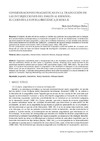Identificador persistente para citar o vincular este elemento:
https://accedacris.ulpgc.es/jspui/handle/10553/58821
| Campo DC | Valor | idioma |
|---|---|---|
| dc.contributor.author | Rodríguez Medina, María Jesús | - |
| dc.date.accessioned | 2019-12-16T20:21:57Z | - |
| dc.date.available | 2019-12-16T20:21:57Z | - |
| dc.date.issued | 2009 | - |
| dc.identifier.issn | 1886-2438 | - |
| dc.identifier.other | Dialnet | - |
| dc.identifier.other | WoS | - |
| dc.identifier.uri | https://accedacris.ulpgc.es/handle/10553/58821 | - |
| dc.description.abstract | El objetivo de este artículo es analizar un ámbito muy particular de la pragmática de los diálogos de la novela británica contemporánea y su traducción al español: el uso de las interjecciones. Consideramos que estos aspectos del plano pragmático, a pesar de su evidente importancia, no han recibido tanta atención como cabría esperar en los estudios de Traducción, a excepción de algunos trabajos centrados en el sector audiovisual de autores como Castro (1997) o Gómez Capuz (1993, 1998, 2001). Por ello, proponemos una serie de pautas de traducción al español, a partir del análisis de un corpus, contribuyendo así a fijar las bases de futuros trabajos de investigación orientados a la mejora de la docencia y la práctica de esta especialidad. | - |
| dc.description.abstract | Pragmatics undoubtedly plays a fundamental role in the translation process. However, it has not been as extensively studied as other areas in Translation Studies, excepting some works focused on the audiovisual market by authors such as Castro (1997) and Gómez Capuz (1993, 1998, 2001). The aim of this paper is to analyze one particular aspect of pragmatics in the translation of dialogues of the contemporary British novel: the use of interjections. Since this study is seen as a preliminary stage or introduction to further research into the topic, it indicates some general patterns found after the analysis of a corpus intended to be applied to Translation Teaching Methodology and the professional practice itself. | - |
| dc.language | spa | - |
| dc.relation.ispartof | Revista de Linguistica y Lenguas Aplicadas | - |
| dc.source | Revista de lingüística y lenguas aplicadas [ISSN 1886-2438] (4), p. 175-187 | - |
| dc.subject | 570112 Traducción | - |
| dc.subject.other | Pragmática | - |
| dc.subject.other | Interjecciones | - |
| dc.subject.other | Traducciones literaria | - |
| dc.subject.other | Lenguaje coloquial | - |
| dc.subject.other | Pragmatics | - |
| dc.subject.other | Interjections | - |
| dc.subject.other | Literary translation | - |
| dc.subject.other | Colloquial speech | - |
| dc.title | Consideraciones pragmáticas en la traducción de las interjecciones del inglés al español: el caso de la novela británica "Jemima B." | - |
| dc.title.alternative | Pragmatic Considerations In The Translation Of Interjections From English To Spanish The Case Of The British Novel Jemima B. | - |
| dc.type | info:eu-repo/semantics/article | - |
| dc.type | Article | - |
| dc.identifier.isi | 000214558100013 | - |
| dc.identifier.url | http://dialnet.unirioja.es/servlet/articulo?codigo=2993233 | - |
| dc.identifier.eissn | 1886-6298 | - |
| dc.description.lastpage | 187 | - |
| dc.identifier.issue | 4 | - |
| dc.description.firstpage | 175 | - |
| dc.relation.volume | 4 | - |
| dc.investigacion | Artes y Humanidades | - |
| dc.type2 | Artículo | - |
| dc.contributor.daisngid | 28383737 | - |
| dc.contributor.authordialnetid | 170379 | - |
| dc.identifier.dialnet | 2993233ARTREV | - |
| dc.description.numberofpages | 13 | - |
| dc.contributor.wosstandard | WOS:Medina, MJR | - |
| dc.date.coverdate | 2009 | - |
| dc.identifier.ulpgc | Sí | es |
| dc.description.sellofecyt | Sello FECYT | |
| dc.description.esci | ESCI | |
| dc.description.erihplus | ERIH PLUS | |
| item.grantfulltext | open | - |
| item.fulltext | Con texto completo | - |
| crisitem.author.dept | GIR Estudios sociolingüísticos y socioculturales | - |
| crisitem.author.dept | Departamento de Filología Moderna, Traducción e Interpretación | - |
| crisitem.author.orcid | 0000-0002-1928-8839 | - |
| crisitem.author.parentorg | Departamento de Filología Moderna, Traducción e Interpretación | - |
| crisitem.author.fullName | Rodríguez Medina, María Jesús | - |
| Colección: | Artículos | |
Citas de WEB OF SCIENCETM
Citations
1
actualizado el 25-feb-2024
Visitas
148
actualizado el 05-oct-2024
Descargas
120
actualizado el 05-oct-2024
Google ScholarTM
Verifica
Comparte
Exporta metadatos
Los elementos en ULPGC accedaCRIS están protegidos por derechos de autor con todos los derechos reservados, a menos que se indique lo contrario.
